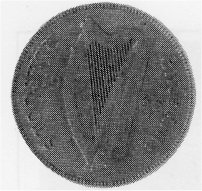 |
ROBERT BURNS AND
THE LAST HARPBY SAM JOHNSTON |
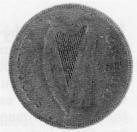 |
To a whole generation of Dromore folk the
name Robert Burns does not immediately suggest the immortal
Ayreshire bard.
Instead it conjures up in the mind's eye a
small man in a flat cap and well-worn showerproof who was
once as much a landmark in the Market Square as the Town
Hall, which had been build by his father many years ago.
Robert, who was feeble-minded, appar ently having no living
relatives, was well cared for by a lady in Meeting Street
who saw to all his needs. He spent most of his time
meandering slowly around the town where he seemed to enjoy
the daily excitement of the town Square. Over the years he
gradually became one of Dromore's best known and much loved
characters, with his Chaplin-esque walk, wide grin and his
greeting of "Hi-ye King William?" to every male he
encountered.
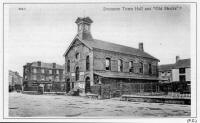 Robert
was not averse to indulging in a little begging by asking
for a "harp" which was his name for a penny. At one time
this coin bore the replica of an Irish harp on it's reverse
side. When asked to choose from a handful of proffered coins
he would ignore the silver coins of anykind, thinking them
to be of less value than his "harp". Robert
was not averse to indulging in a little begging by asking
for a "harp" which was his name for a penny. At one time
this coin bore the replica of an Irish harp on it's reverse
side. When asked to choose from a handful of proffered coins
he would ignore the silver coins of anykind, thinking them
to be of less value than his "harp".
Robert was generally quiet and inoffensive.
Although it was soon discovered that certain words or
phrases would have the effect of arousing in him quite an
inexplicable fury and rage. Sadly, human nature being what
it is, there were those who's perverted idea of fun led
them to ignite this reaction in him before moving away,
leaving him swearing loudly to himself. Much to the
bewilderment and consternation of innocent by-standers.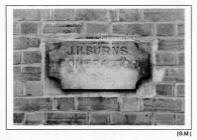
Around about the 1950's Robert Burns died
and the Rev. Kilpatrick in announcing his funeral in the
Cathedral, expressed the hope that many would pay their last
respects to the old man by attending. In the event a vast
multitude followed the cortege to his last resting place in
the churchyard. So great was the concourse that a stranger
could have been forgiven for presuming that some person of
great distinction was being interred.
As I sat in the church, before and during the burial
service, my mind was full of thoughts of this old man I had
known so well. There came, unbidden, into my mind the
following lines in a metre I had never used before. A
ready-made epitaph for this fellow townsman who had found
fame in his own humble way.
| |
"You know old Robert Burns?"
Well, Robert's dead!"
"That old man of queer turns?"
"Yes. Robert's dead."
And all those folk who tempted Robert sore
Their shameful tricks will play on him no more,
For Robert's dead. |
|
| |
For pennies he would plead,
"Give me a harp".
His was a trivial need,
"Give me a harp".
And daily as he shuffled through the town,
He would'nt take your "bob" or "half-a-crown".
"Give me a harp". |
| |
I like to think he'll
get
To Heaven's gate.
I think that he'll be met
At Heaven's gate
And bidden "welcome! come and meet your kin,
You've naught to fear, fools cannot err herein
-----------------and here's a harp!" |
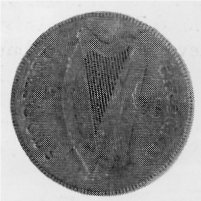 |

CHAT
LINES - yarns from the Station yard
as told to me by a former porter at Dromore Station.
BY ROSEMARY McMILLAN
I started at Ashfield Halt in 1943, as a boy
porter. I suppose I was about maybe sixteen then. A vacancy
occurred in Dromore and I got down in there before I was
twenty.
The Station Master in those days was R. H.
W. Reevy - he was very regimented of course - he talked very
quick! There were usually two clerks, a chappie called Mason
and another one was Frank Boal. There were three signalmen,
John Fallon, Bob Eliot and Fred Savage.
In 1943 I earned a pound a week and of that,
4d went to the pension and if I had went on according to
plan, I w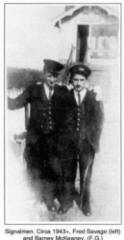 ould
have got ten shillings aweek when I retired. In those days
ten bob was a decent pension because a ploughman was getting
twelve and six for working! In fact, old railwaymen, you
would have thought, should have been much sought after!
There was a steam crane man and that was a highly
specialised job, he could lift things and set them down,
like he was using a knife and fork. He only got seven
shillings and sixpence a week of a pension when he retired. ould
have got ten shillings aweek when I retired. In those days
ten bob was a decent pension because a ploughman was getting
twelve and six for working! In fact, old railwaymen, you
would have thought, should have been much sought after!
There was a steam crane man and that was a highly
specialised job, he could lift things and set them down,
like he was using a knife and fork. He only got seven
shillings and sixpence a week of a pension when he retired.
The wages were paid in shillings and pence.
If say, you had to get five pounds, well that was a hundred
shillings. They didn't mention pounds at all, because I
suppose you see, the wages were so small. This happened up
to about twenty-five years ago. The late Brian McConnell M.P.
expressed his amazement at this "In the name of goodness",
he says to me, "they're not still at that auld game are
they?" We were paid on a Thursday, which was unique, and
there was a time when we were only paid once a fortnight!
And when you joined the railway, you didn't have to have an
unemployment thing and a sickness one. You only had the
sickness benefit because you would never be unemployed on
the railway. It was like joining the army nearly.
I was never on the Bureau in my life. I went
to Dromore, to the Town Hall, and got my Bureau card and and
handed it in. The only time I was ever back in the Bureau
office was in Lisburn. There was a dispute on and they had
laid us off. I promptly went to my local Social Security
office, and the girl asked me when I was there last and I
said, "I was never here before but I was in the one in
Dromore in 1943!" And in fact, that was in July of that
year, and I have a letter there from them, saying that the
adjudicator had looked at my case, and had decided that I
wasn't entitled to any money, because I wasn't unemployed -
I was just laid off- or something to that effect. But, it
took from July to September to tell me that, so I'd have
been hungry, if I had of needed money!
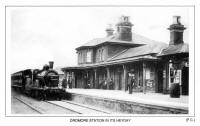
Starting times at Banbridge were 4 a.m. if
you were signalman and 4.30 a.m. if you were shunting. I
remember when I was living at Mullafernaghan; at that time
there was a guard on the train called Ned O'Hagen. When he
heard I lived at Mullafernaghan he says, "Sure we'll pick
you up and bring you up (to Banbridge). You needn't ride the
bicycle away up here." I thought that was a good job, but
next morning I was wakened by him coming shouting round the
house, "Are you going to lie all day?" It was about a
quarter to four in the morning. That was the morning I slept
in. I very rarely slept in. You were normally rostered for
eight hours but you could be asked to do another four hours
for which you were given so many hours notice, unless there
was an emergency.

You were paid time and a quarter for
overtime work between six in the morning and ten at night.
If you were on night duty you got time and a quarter from
ten o'clock at night to six in the morning. If you were on
overtime during those hours you got time and a half. You got
time and a half on a Sunday. Eventually there was a double
time on a Sunday. Then we got British rates and they put it
back to time and three-quarters for a Sunday and to this day
it is time and three-quarters except for P-way men
(menders!) they get double time. There used to be a saying
that, when railwaymen went to church, they had to take a
piece of bread for the Sexton's dog - for he didn't know
them.
The uniform came with the job and of course
it was in various grades. The travelling ticket collectors,
they were usually measured by two tailors who came over from
England. You were measured on the spot. In the case of the
Banbridge line you would have been notified that the tailor
was going to be on the train, on such and such a day, and
the Station Master had to have all staff on the platform to
get their measurement done. There is a story that, one day
when the Enterprise (Dublin Express) was going through
Lisburn this man says, "Oh look, there's somebody lookin
out" and this fellow replied "Yes, that's the railway
tailor, he's measuring us!" Some of the uniforms they sent
out were terrible, not the right size at all. Bob Eliot got
a form for measurements for an overcoat. In those days they
were a big heavy overcoat and they were puce, a sort of
purply colour - a terrible lookin thing! But Bob, he thought
they were the greatest thing at all for putting over the bed
in the winter-time. So he got me to measure him in the
cabin. "Put plenty of length on it," he says - so I, of
course, put it away down near his ankles, and it just came
back the normal size.
Bob had a funny way of saying things. One
day, he was leaning over the handrail of the signal box,
puffing away at his pipe and he observed "I see there's
going to be another concert the night agin" "What d'ye
mean?" I says. He says "I see an auld fella there (a tomcat)
goin' round puttin' up the posters!"
The railway carried all the general
merchandise for the shops - jams and all the different
grocery stuff. There was a lot of meal and fertiliser.
Fertiliser was a big thing. I think it was carried very,
very cheaply and then it was stored there at the station. In
fact, the late Francis Russell was the biggest merchant for
that fertiliser in those days. Tucker Thompson and - Gamble,
they were sent up to help us store the stuff. It was taken
out of the wagons and piled up about twenty bags high in the
store. And those boys were tough. Bear in mind they were two
hundredweight bags at that time. They had a barrel, so the
two of them set the bag on the barrel - then one of them put
the bag on his back and walked up the stack to the very top
- dumped it and came back down again. Och, it was hard work.
There was a lot of coal brought in. There
was a Murphy about Dromore in the dim dark days. He had an
office beside the Rectory, if I remember right. There was
bad coal at one time and somebody gathered up a lot of
stones and set a sign on it "Murphy's Coal!" Tom Carlisle,
was the last one to get coal at Dromore Station. He also
done the cartin' down to the town and old Bob McIlrath, I
think was the man who drove the horse. That big black horse
went on until he died of pneumonia or something. After that
goods were taken up and down in Tom Carlisle's coal lorry.
During the war there was a heap of coal behind the store. It
was piled up by German prisoners of war and painted white so
that if any was stolen it would show up.
Of course all the bread came that way -
McCombs, Barney Hughes and Inglis. Inglis bread went into
Princes Street to an agent that Davy Wilkinson and all them
worked for.
Loads of spuds were sent out on the trains
and it was usual for the farmer to tip the porter who loaded
his crop onto the train. One farmer who was remiss about
this was seen searching for something on the platform,
whereupon it was duly remarked "Mister, if your'e lookin'
for your purse ye didna loss it about here!"
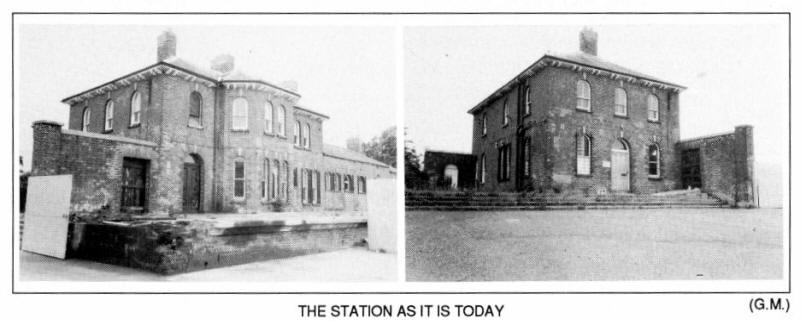

There were certain things I would never
forget. Like, I remember one morning when I lived in what
was known as the Moss Loanin and I was riding to Ashfield
Halt to start at a quarter past six. It was during the
blackout. The blackout suited me well for my battery lamp
was very poor anyway - so I was keepin within the rules - in
a sense! There was a kind of dampness in the road and
sometimes I would have come on the B men. On occasion, they
would have stopped me but eventually they got to know me and
might even have said "Good morning" when I was going past.
But, this particular morning, with the B's shadow on the
road and with my poor light, now and again I slowed up,
because you would have thought there was something there ye
see. I turned off the main road onto the Ashfield road at
Mullen's Corner and this particular shape became so real
that I put my hand out. It materialised into a horse - boys
the hairs stood on the back of my neck and I went off the
bicycle. It must have kicked out but I was very fortunate I
only got a stay of the mudguard broken.
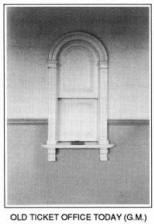 It
was all steam trains in those days. I remember the first
diesels on the Banbridge line. In fact, the GNR pioneered
diesels. A Dromore man was actually in the middle of that -
a Mister Hobart. He wanted Harland and Wolff to have a
separate laboratory for diesel traction, because, he said
they were foremost and had the railway more or less at their
disposal for trying them out. There is one of the old GNR
diesels in the Isle of Man. It
was all steam trains in those days. I remember the first
diesels on the Banbridge line. In fact, the GNR pioneered
diesels. A Dromore man was actually in the middle of that -
a Mister Hobart. He wanted Harland and Wolff to have a
separate laboratory for diesel traction, because, he said
they were foremost and had the railway more or less at their
disposal for trying them out. There is one of the old GNR
diesels in the Isle of Man.
When I was a ticket collector at Banbridge,
an American arrived lookin for the train for Dublin. At that
time there was a wee diesel, some of them called it the "Dinkie",
which made the connection between Banbridge and Scarva for
the Dublin train, but when it had to be serviced, there was
only one ye see, it was replaced by a small B engine and one
coach. So, when this small engine and one coach came in the
American said to me, "You did say I would get the Dublin
connection here?" I says "Yes, that's right, that's it now".
He took one look and said, "I guess I'll take one of those
home to the kids!"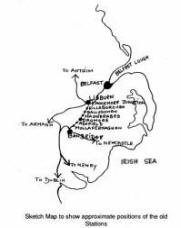
I was transferred the year we got the prize
for the best kept station. Old Bob Eliot, smokin' the pipe
as usual,
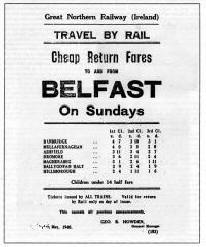 he
said "Ye know, yez wouldn'tlisten to me when I was tellin
yez about these flowers". Ye know they sent seeds and all
for it, and we put in a lot of work makin' beds ye see. He
said, "The company could see yez were doin' nothing when yez
don all that work. I told yez at the start, when yez got the
cheque that was when they were soapin' yez now they have
started to shave yez!" So they transferred me to Lisburn! he
said "Ye know, yez wouldn'tlisten to me when I was tellin
yez about these flowers". Ye know they sent seeds and all
for it, and we put in a lot of work makin' beds ye see. He
said, "The company could see yez were doin' nothing when yez
don all that work. I told yez at the start, when yez got the
cheque that was when they were soapin' yez now they have
started to shave yez!" So they transferred me to Lisburn!
It was a good old job. I worked for them for
forty seven years and they never caught me on yet!
The Ulster Railway Co. gave financial
encouragement to other smaller companies - one of which was
the Banbridge, Lisburn and Belfast Co. The line was opened
on July 13th, 1863. It was fifteen miles long and branched
South from Knockmore Junction. Like many other lines it fell
to the Beeching axe in 1956.

MEMORIES
OF EARLY SCHOOLDAYS
BY MURIEL McVEIGH
There it stands almost unchanged since 1915
when I stumbled over its doorstep at the bright old age of
four, the building that was then known as Garvaghy National
School, just one of hundreds perhaps thousands such
erections put there by the churches throughout this our
"land of saints and scholars". Someone with more pretensions
to historical know-ledge than I will be able to date these
buildings of which not too many, I imagine, remain
materially unchanged over the years as this one.
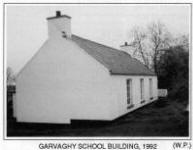 It
was the centre of my life for the next decade, and so many
memories crowd each other out that I am finding it hard to
focus on any one. There were those frosty mornings when we
chased each other along the road to get to break the ice
that had formed in the potholes during the night, the stove
in school had not been lit long enough to destroy Jack
Frost's artistry on all the school windows and the remains
of yesterday's drinking water in the bucket in the school
porch had a lovely coating of ice to be lifted out and
thrown at any convenient target by those on their way to the
well to fetch water for today's consumption. Delight when
snow had fallen to enable slides to grow from school gate to
church gate ably produced by the hobnails in the `big' boy's
boots while the smaller children had their own private slide
to help each other negotiate without falling in the little
playground inside the gate. Traffic on the road was not a
problem since bicycles had bells and farm carts had noisy
iron-shod wheels. It
was the centre of my life for the next decade, and so many
memories crowd each other out that I am finding it hard to
focus on any one. There were those frosty mornings when we
chased each other along the road to get to break the ice
that had formed in the potholes during the night, the stove
in school had not been lit long enough to destroy Jack
Frost's artistry on all the school windows and the remains
of yesterday's drinking water in the bucket in the school
porch had a lovely coating of ice to be lifted out and
thrown at any convenient target by those on their way to the
well to fetch water for today's consumption. Delight when
snow had fallen to enable slides to grow from school gate to
church gate ably produced by the hobnails in the `big' boy's
boots while the smaller children had their own private slide
to help each other negotiate without falling in the little
playground inside the gate. Traffic on the road was not a
problem since bicycles had bells and farm carts had noisy
iron-shod wheels.
On occasional rainy days the porch reeked of
wet overcoats and caps and it was a comfort to gather round
the stove to get stockings dried before the serious day's
work began with religious instruction, as stated on the card
hanging by the door. This card was carefully turned at the
end of the half-hour to proclaim to anyone who came in that
secular instruction was now the order of the day. Those were
the days when the lunches, mostly consisting of soda bread
and butter washed down by fresh sweet milk out of a bottle
carried in the satchels of sixty or so noisy children had to
be consumed inside the building during the half-hour
allocated to `playtime' no peace for the teachers on those
day's, fortunately few.
Spring never failed to provide us with so
many new experiences, new leaves to enable us to identify
all the trees in the locality, new flowers to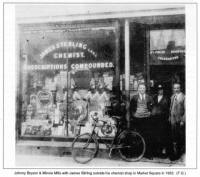 be found in the hedgerows and recorded in the nature study
book which hung on the wall, bird's nests to be found and
the variety of size and colour of eggs learnt and most of
all winter boots or clogs discarded when bare feet were
again in evidence and toes were `crigged' or scuffled along
the dust at the sides of the roads. What a relief it must
have been to the ears of the teachers not to have to put up
with the noise of studded boots or shod clogs on wooden
floors.
be found in the hedgerows and recorded in the nature study
book which hung on the wall, bird's nests to be found and
the variety of size and colour of eggs learnt and most of
all winter boots or clogs discarded when bare feet were
again in evidence and toes were `crigged' or scuffled along
the dust at the sides of the roads. What a relief it must
have been to the ears of the teachers not to have to put up
with the noise of studded boots or shod clogs on wooden
floors.
In school as well as introducing us to
cursive handwriting, transcription, dictation, composition,
analysing, parsing, parts of speech, literature, poetry,
geography, history, multiplication and division tables and
application, decimals, fractions and such mathematical exer
cises even up to stocks and shares Miss Clinton presented us
with the rudiments of science viz. properties of gases like
oxygen and carbon dioxide, astronomy as in the movements of
earth and moon in relation to sun causing seasons and day
and night and particularly natural history I can still
remember the thrill of learning about dicotyledons and
monocotyledons.
When we reached the senior classes we donned
our white aprons and learnt to bake bread and scones, cook
dinners such as Irish stew and a favourite of mine to this
day boiled bacon and cabbage. We even had lessons on how to
keep certain household artifacts clean. It was a red letter
day when I took our halldoor brass knocker to school to
learn how to keep it shining and bright though I must
confess that I've forgotten most of the commodities that we
used like the powder we called whitening, bath brick and
black lead for the stove. Well, household maintenance was
never my forte.
Perhaps more important were the incidental
lessons of behaviour when we learned to get along with our
neighbours by being tolerant, forgiving, truthful, observing
others right to privacy and respecting other people's
property, lessons not always easy to learn. Of course we had
our disagreements over which we fought with whatever weapons
were available as fists for the boys, words by those able to
use them and even hair pulling shame! Yes, shame was
instilled in us too. I can hear the admonition 'you ought to
be ashamed of yourself coming at me over the years and I am
sure it deterred many of us from indulging recklessly in
unacceptable behaviour.
Yes, there stands the building now used as a
church hall where hundreds of children spent their early
years willingly or otherwise, a monument to those who went
on to live out their lives all over the world and adjusted
to fit into whatever environment fate placed them.

HORSES KILLED BY
LIGHTNING
BY TREVOR MARTIN
The Irish News of 28th May, 1920 contains
the following story in connection with Dromore.
"During a violent thunderstorm over
Dromore and district on Wednesday evening, a farmer, Robert
Thompson, of Islanderry, and his nephew, a young man named
Walter Arlow were struck down by lightning. Two horses,
valued about 100 pounds, with which they were working at
potatoes, were killed instantaneously.
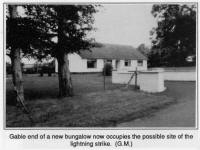 Arlow
was the first to recover from the shock, and on coming to,
succeeded in calling help and having Thompson removed home.
Dr. Carlisle was quickly in attendance and it is stated
that, although partially paralysed, the patient will
eventually recover. Arlow says that his forehead was
scorched, and that when he recovered consciousness, he
noticed that the dead horses appeared to be enveloped in a
blue smoke, and that a heavy odour exuded from their bodies. Arlow
was the first to recover from the shock, and on coming to,
succeeded in calling help and having Thompson removed home.
Dr. Carlisle was quickly in attendance and it is stated
that, although partially paralysed, the patient will
eventually recover. Arlow says that his forehead was
scorched, and that when he recovered consciousness, he
noticed that the dead horses appeared to be enveloped in a
blue smoke, and that a heavy odour exuded from their bodies.
The rainfall which followed the
thunderstorm was the most extraordinary ever known in the
locality. Few of the local water channels were able to
contain it, with the result that many parts of the town were
flooded."
Lightning is caused when there is a
discharge of electricity either between clouds or between
clouds and the earth. Although most lightning storms pass
peacefully there have been many fatalities. In Zimbabwe in
1972 a bolt of lightning hit a building killing 25 people.
The injuries caused by lightning can be varied depending on
the severity of the strike. What actually happens is that
the body is subjected to an electrical discharge which
interferes with the body's own electrical system. In severe
cases this is so great that the heart will stop altogether,
it additionally can cause the skin to be burned to a
significant degree.
Intrigued by this I set out to find out some
more information and indeed to see if anyone could recall
either of the two gentlemen concerned. We contacted a
president of Islanderry who was able to supply us with the
following information.
There was a seam of an iron substance
contained in the ground at least 500 yards long that emerges
to the surface in various locations in the area. The map
shown on the opposing page gives you an idea of the extent
of the iron area and also shows the spot where both men were
struck.
My informant cites several places where this
seam surfaces near his hedgerows pointing to the fact that
lightning h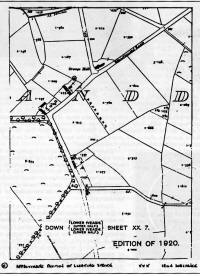 ad
struck those places burning his hedges out. He also recalled
that Robert Thompson was using an iron plough and that the
harnesses of the horses also contained a great deal of iron. ad
struck those places burning his hedges out. He also recalled
that Robert Thompson was using an iron plough and that the
harnesses of the horses also contained a great deal of iron.
The lightning struck the plough killing both
horses and running up the handles of the plough injuring
Robert Thompson. Young Arlow who was in the vicinity was hit
by the force of the strike but was able to summon help to
get Robert to hospital.
He spent some time in hospital recovering
from his ordeal and the marks of the strike on his body, two
blue almost bruise like marks the size of a farthing were
with him until the day he died. The psychological effects
also stayed with him throughout his life and he could tell
of the onset of thunder storms, hiding in the corner of the
room with his eyes closed until they had passed overhead.
An interesting aside was that after being
struck by lightning Robert developed the power to divine
water saying that he could feel it under his feet. He was
much in demand in the area and his skill developed to such
an extent that he could tell the depth of water when using a
divining rod.
 |